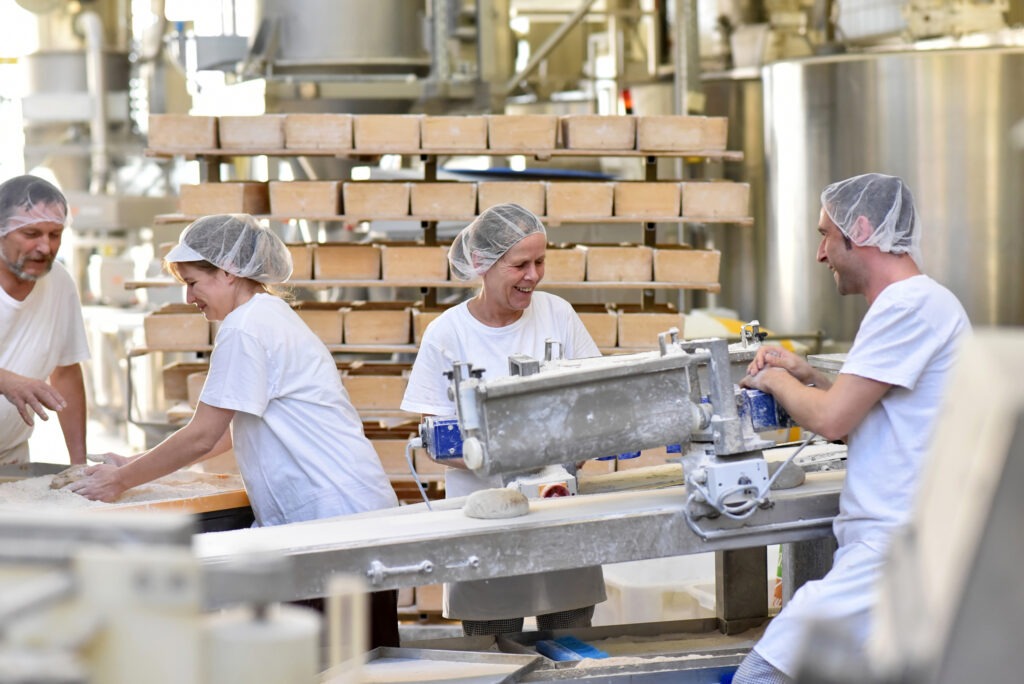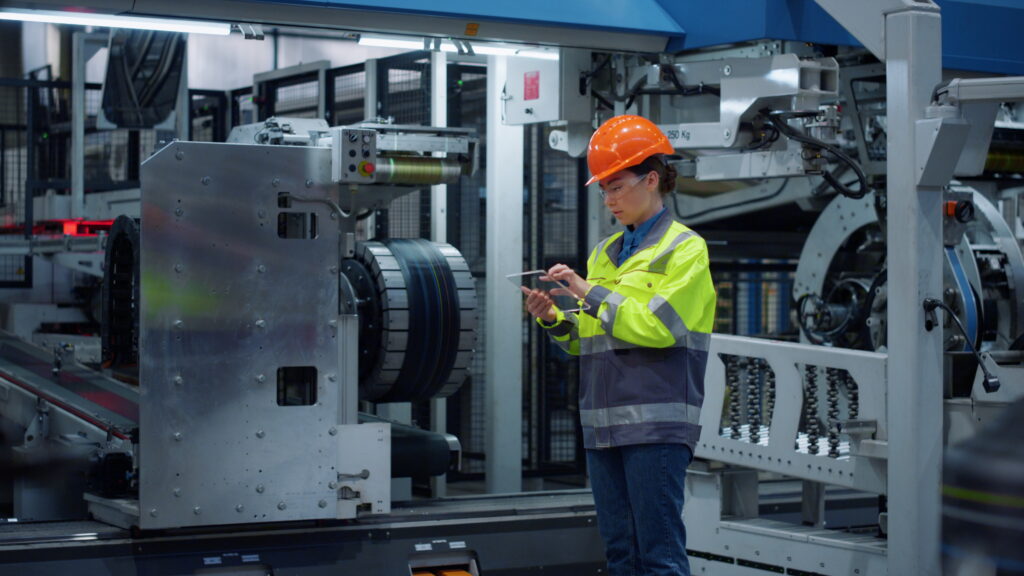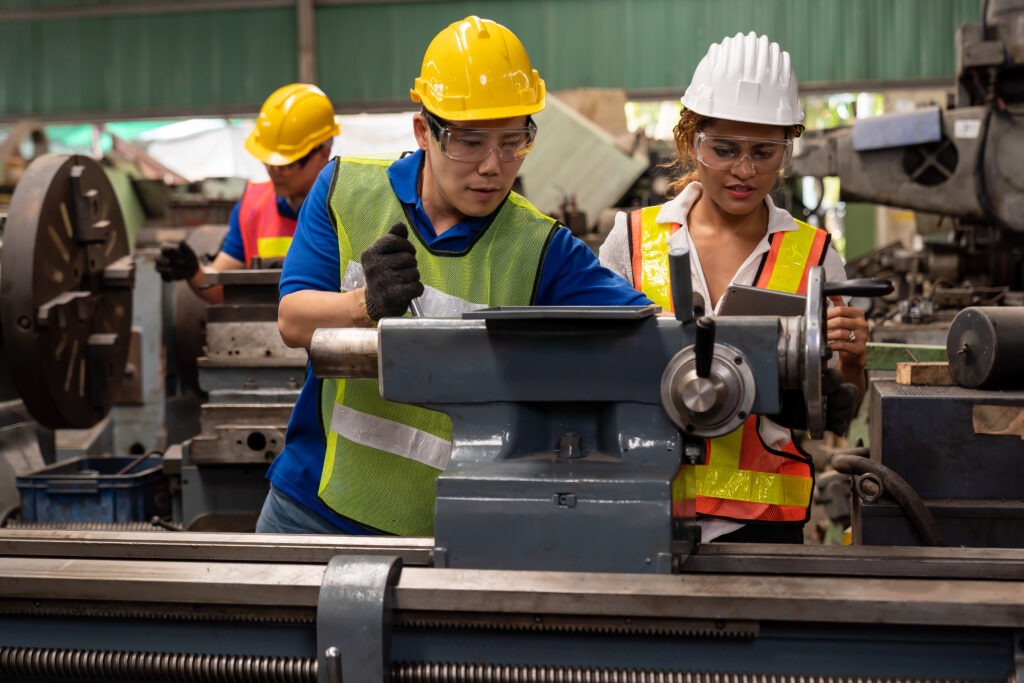The production employee - What is the terminology and the job?
If you want to call yourself a production worker, you shouldn’t just be interested in the job itself, you need to be ready to roll up your sleeves and, more importantly, want to. That way, you'll find plenty of tasks and areas of application right from the start, even as a career changer.
Table of contents
- The production employee - What is the terminology and the job?
- Production employee - Tasks
- What jobs are there for production workers?
- Why is there such a high demand for production employees?
- How can I find vacancies for production workers?
- What jobs are there in production without training?
- What does a lateral entry into production look like?
Estimated reading time: 9 minutes
Production employee - Tasks
The tasks of a production employee are varied and depend on the specific job, working conditions, and situation. In logistics, for example, the focus is on monitoring workflows and performing ongoing quality control.
In companies where goods are actively manufactured, the role often involves operating machinery. These machines must be run and monitored during operation and require regular maintenance and cleaning.
Employees also frequently work at stations where they rework components or finished product, either using additional machines or by hand.
Processing equipment must be regularly refilled or restocked. Assembly tasks, as well as cutting and gluing activities, are also part of the job. Naturally, sufficient quality must be maintained throughout the production process, which requires continuous inspection.
Production employees don’t just monitor operations, they also prepare the workpieces and materials required. They ensure these are transported correctly, along with the finished goods, which they also sort and pack.
In addition to these core activities, production employees handle various support tasks. These include cleaning and organizing production areas, ensuring workplace safety, and assisting with the documentation of completed work.

What jobs are there for production workers?
Anyone who hears the question “What jobs are there for production workers?” will quickly ask themselves another: “Why even ask?”, because the answer seems obvious: production workers work in production.
While that may sound logical at first, the reality is that production roles span a wide range of jobs across many different industries. It starts with metal processing, for example, and extends to mechanical engineering.
So far this seems logical, but there are other sectors that are quickly overlooked when it comes to production. For example, there is the Food production. There is a large selection of activities here. However, this choice increases enormously when other sectors are included. These are the textile, automotive, electrical and plastics industries.
Production workers are in demand across all these fields. Even as a career changer, there are plenty of opportunities to get involved, especially if you bring certain additional qualifications that are relevant to the job. These might include a forklift license, or training as an electrician or Welder. Experience in machine maintenance or in handling production equipment is also a big plus. Naturally, a good level of technical understanding and manual dexterity are also essential.
Why is there such a high demand for production employees?
We hear a lot about the shortage of skilled workers, so it's no surprise that production staff are also in short supply. In this field especially, it all comes down to dedicated employees. Without the many helping hands in production, the entire economy would grind to a halt. In other words, production workers are the foundation on which the entire economy is built.
Skilled production employees don’t just support their own companies and the national economy, they also help ensure that “Made in Germany” continues to be recognized worldwide as a mark of quality.
Technological change is advancing rapidly. But that doesn’t mean production workers are becoming obsolete. On the contrary, automation is creating entirely new areas of employment and demands fresh skills. That presents both a challenge and an opportunity.
Nowadays, companies are investing more and more in modern workplaces and in the qualified employees who work there. This creates a good income, a good working environment and good motivation in production.
How can I find vacancies for production workers?
Job vacancies for production workers can be found everywhere, starting with major job portals online and the Federal Employment Agency. Many companies also list openings on their own career pages, making it easy to search for specific roles at specific firms.
Less targeted, but often more comprehensive, are career and networking platforms like LinkedIn. There are also job fairs and recruitment events, so opportunities are always out there if you know where to look.
To navigate the flood of job listings, it’s important to search with a clear focus. For example, if you're using a general search engine, start with a core term like “job vacancies” and then narrow it down with specifics, such as the role or company. A search like “job vacancies machine operator [company name]” can yield more precise results.
Job requirements don’t always need to be met 100%. If you can demonstrate relevant experience, you may be able to offset certain gaps. That said, the core requirements should still be fulfilled. If a job calls for a forklift license, a regular driver’s license won’t cut it.
Always read job descriptions carefully. It’s important to remember: you’re not just applying to the company, the company is also applying to you. For things to work out in the long run, the chemistry has to be right. A good job listing should clearly reflect this and focus on qualifications and skills that applicants actually possess. Other expectations, like flexibility or physical stamina, should also be clearly stated and align with what you’re realistically willing to bring to the table.
What jobs are there in production without training?
There are actually various jobs in production that can be done without special training. These range from machine operator to unskilled worker. In detail, the possibilities look like this:
- Production helpers: They help with various activities, including the assembly, manufacture and operation of machines. They work under the guidance of experienced colleagues.
- Unskilled worker: They perform activities that are directly and indirectly related to production. This begins with the preparation of work parts and ends with the clean-up and clear-out.
- Warehouse assistant: In this role, unskilled employees help with packing, picking, moving goods and receiving goods.
- Assembly workers: They are needed to assemble products. This is usually done either without tools or only with simple tools.
- Machine operators: They monitor the production processes and control the associated machines.
This also applies to unskilled workers, who are becoming increasingly valuable in today’s labor market. An unskilled job can serve as a gateway to a phase of training and further education. During this time, individuals can gain qualifications and experience that open the door to more advanced roles requiring specific credentials.

What does a lateral entry into production look like?
Production workers are in high demand, which makes lateral entry, switching into the field from another profession, a viable option for many. This typically involves someone with training or experience in a different area transitioning into a production role. With certain prior experience, such a career move is often quite manageable.
Candidates with backgrounds in logistics, technology, or skilled trades are especially welcome as lateral entrants. Even employees from customer service are valued, as they bring a unique perspective and experience in dealing with people, skills that can be surprisingly useful in production environments as well.
Career changers without training
Career changers enter the production field without any specific training. However, this is not a problem as long as they possess a sufficient level of technical understanding. This doesn’t necessarily mean prior training on specific machines or systems. Rather, it's about having a basic grasp of technology and a general affinity for working with machinery, enough to understand essential processes and build up further knowledge and skills over time.
Anyone considering a career change into production can significantly improve their chances with a strong application. This starts with well-prepared documents that clearly highlight relevant skills and experience. The motivation behind the switch should also be clearly stated. By doing so, applicants can position themselves as valuable potential employees and stand out from the crowd.
There are also alternative ways to gain initial experience and build contacts. Recruitment agencies and temp agencies are often a good first step. These agencies are regularly looking for production staff, frequently for roles that require little or no prior knowledge.
Once a new employee has proven themselves or developed a clear interest in the field, further training opportunities may become available, often sponsored by the employer. This allows career changers to gradually develop into fully qualified professionals. As their skill set grows, so does their value to the company and with it, their earning potential.
Related topics:
